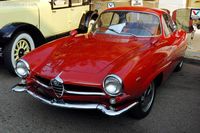.
Alfa Romeo Giulietta SS: Difference between revisions
| Line 108: | Line 108: | ||
==See also== | ==See also== | ||
[[Alfa Romeo Giulia]] | *[[Alfa Romeo Giulia]] | ||
[[Alfa Romeo Giulietta]] | *[[Alfa Romeo Giulietta]] | ||
==External Links== | ==External Links== | ||
Revision as of 02:55, 17 December 2006
| Alfa Romeo Giulietta SS | |
|---|---|

| |
| Manufacturer | Alfa Romeo |
| Production | 1959-1965 Made 2766 |
| Predecessor | Alfa Romeo Giulietta Sprint Veloce |
| Class | Sports Car |
| Engine | 1290 cc I-4 |
| Wheelbase | 92.5 inches(2350mm) |
| Length | 180.5 inches(4585mm) |
| Width | 61.4 inches(1560mm) |
| Height | 56.3 inches(1430mm) |
| Curb Weight | 2100 lbs.(953 kg) |
| Related | Alfa Romeo Giulietta |
| Body style | 2-Door Coupe |
| Designer | Franco Scaglione working for Bertone |
See Wikicars' comprehensive Alfa_Romeo_Giulietta_SS Review.
Pricing
Base price when new: $5,663
Safety
The car was made before the United States began implementing automobile safety laws in 1967. Regardless, later examples have seatbelts but not any other safety devices.
Photos
Colors
Main Competitors
Unique Attributes
Coefficient of drag is 0.28, the same as the sixth-generation Chevrolet Corvette
Resale Values
- Low $16,500
- Average $24,000
- High $33,000
Criticisms
- Typical straight-armed Italian driving position
- Very small trunk
- Tight cabin for larger people
- Mechanicals need freqent attention
First Generation/Origins
The Sprint Speciale was originally based on the Alfa Romeo Giulietta, the post-war Alfa that came in coupe(Sprint), sedan(Berlina), and convertible(Spider) variations. The Veloce was a more performance-oriented option that could be had on the Sprint or Spider. The Berlina Ti was the performace variant of the Berlina sedan.
The Giulietta Sprint Speciale was a more upscale version of the normal Sprint and featured a smooth, 2-door gran turismo body by Bertone. Aluminum was used for the bodies of the first SS's, but was changed over to steel after 1959. In the efforts to make the SS as light as possible, the wheelbase was made four inches shorter than the Sprint's. Since it was intended for competition use, the SS only had room for two people and a limited amount of storage for luggage. However, this allowed the cabin to be much more spacious than the four-seat Sprint.
At the 1960 Turin Motor Show, Zagato showed their own version of the SS. Called the Giulietta SZ (Speciale Zagato), it was a much more rotund car, resembling early Porsches in shape. It was meant entirely for racing use, and was lighter thn the SS because a great amount of the underframe was removed. It was, understandably, less comfortable, less practical, and thus less popular than the SS with the general public.
Bertone was responsible for not olny the design of the SS, but also its production. Early SS's made by Bertone had sharper raked hoods and lower grilles, giving them the nickname "Low Nose". 101 of these cars were made between 1958 and 1959, six of these used lightened aluminum for the body and plastic for the windows.
The Alfa Romeo Giulia was introduced in 1962, and replaced the Giulietta lineup. Despite this, the SS continued using many parts from the Giulietta and added newer Giulia parts aswell. The Giulia recieved an upgraded Veloce 1570cc engine in 1963 that produced 126 horsepower.






